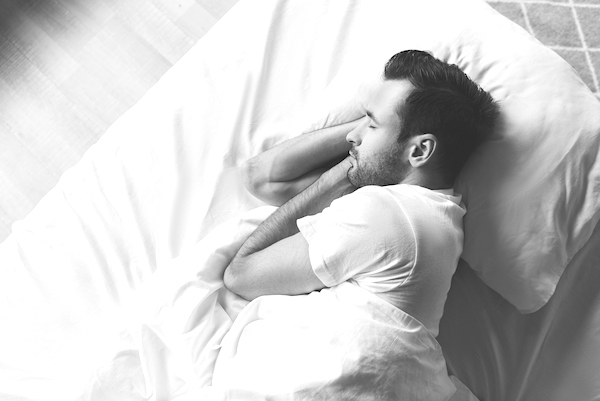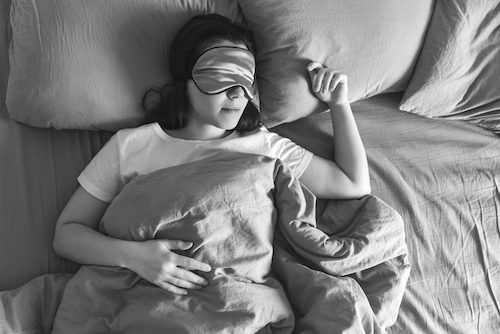Stop snoring
Snoring is the sound of the soft tissue at the back of your throat vibrating as you breathe. Relaxed tissue tends to be softer and more pliable than when you are awake, and therefore you only snore while you’re asleep.
Snoring treatment options at our Melbourne clinic include lasers or radiofrequency devices that tighten and reduce this tissue in the upper palate. Over several anti-snoring treatments, your snoring will be reduced and maybe even gone. We have anti-snoring solutions.
Snoring can be triggered by the impacts of some medications, alcohol, smoking, illness and nasal growths or obstructions (like polyps). Being overweight can also contribute to snoring.
Laser snoring treatments and anti-snoring solutions
There are several laser snoring treatment devices used to reduce or stop snoring, including the SleepTight laser treatment and Romeo laser snoring treatments.
The Romeo laser and the SleepTight laser snoring treatment work in the same way to tighten soft palate tissue and stop snoring. At ENRICH Clinic, we prefer to use the Romeo laser.
The negative impacts of snoring
 We most often talk about snoring in joking terms, but anyone who’s had to sleep next to a snorer for any period knows just how destructive snoring is to a good night’s sleep. This negative impact applies to the snorer too, since their airway is being obstructed and therefore it’s not just the noise that’s disturbing; it’s the whole snoring process.
We most often talk about snoring in joking terms, but anyone who’s had to sleep next to a snorer for any period knows just how destructive snoring is to a good night’s sleep. This negative impact applies to the snorer too, since their airway is being obstructed and therefore it’s not just the noise that’s disturbing; it’s the whole snoring process.
Snorers may find themselves increasingly tired, with a restful night’s sleep always a little out of reach. Waking up feeling less than refreshed could be a sign that your sleep is not as deep and rejuvenating as it might be.
Specific causes of snoring in adults and snoring treatments
- Nose anatomy and nasal blockage: When your airways are blocked, you will make a snoring sound. This blockage could be temporary (allergies, infections) or more serious/permanent nostril size, shape or anatomical abnormalities.
- Low tone in the tongue and throat muscles: your mouth and throat are made up partially of muscles, and if these muscles relax too much, they can collapse your airways, resulting in snoring. Muscle relaxation can occur temporarily from alcohol or insomnia medication, and from general tissue laxity as we age.
- Excess throat tissue: If you are overweight, you likely have excess fat around your neck, which can lead to extra pressure on your airways during sleep. Standing upright and lying down are very different things when it comes to gravity. Oversized tonsils or adenoids can also become an issue, though typically only temporarily.
- Loose uvula and soft palate: the soft palate and possibly the uvula (the dangly bit at the back of your throat) can be too soft, narrowing the airway and causing snoring due to contact of the uvula on the throat and soft palate.
Women and snoring
Women who snore are being treated at alarmingly low rates and not because women don’t snore. They do. It’s because women tend to snore more softly than men due to the different size and shape of the neck and neck tissue.
Women’s snoring is typically overlooked and not considered ‘problem’ snoring, but indeed has sometimes very negative consequences. Being tired all the time has far-reaching consequences for a body and mind in anyone.
Men and snoring
Men tend to snore louder and more frequently than women or children due to the size, shape and weight of the neck area. The more tissue that relaxes onto the trachea during sleep, the bigger the snore and the greater the obstruction. This throat and neck relaxation results in greater negative impacts during waking hours.
Children and snoring
Children snoring may sound cute, but it’s almost always a sign of an infection or an airway issue that needs addressing with some urgency. Soft or loud, persistent, regular snoring in children needs to be investigated since it is abnormal.
The tissues around the neck and throat in kids is small and tight, meaning that snoring is coming from unusual causes or tissue formations. Snoring in kids could mean the tonsils or other areas need treatment.
Snoring in children can also be isolated to certain normal events, such as colds and flu, ear infections and sinus issues.
Radiofrequency and laser snoring treatments
We use radiofrequency and laser treatments for snoring, with our SnoreLess program. The aim of the snoring treatments in our SnoreLess program is to reduce the tissue volume while tightening the soft palate. Over the course of a few treatments, this treatment effectively reduces or eliminates snoring.
Who does snoring affect?
Snoring affects over 60 per cent of us but is more common in men than women. Snoring also gets worse as we age, due to tissue laxity.
Nasal obstructions and snoring
The structure and inter-dependencies of the mouth, nose and throat are complex. Our respiratory tract, mouth and facial structures face many demands every day for vital functions: breathing, eating, talking and facial expressions.
Nasal obstructions might include polyps, a deviated septum, chronic sinusitis or nasal congestion. Nasal congestion has been implicated in snoring, causing daytime sleepiness and an increase in snoring.
Nasal obstruction has a negative effect on the sleep cycle since it can elongate the time between REM sleep and increase non-REM sleep. These obstructions alone, however, do not cause sleep apnoea. The size of the tongue may contribute to obstructive sleep apnoea, but other issues include muscle responses of the mouth and jaw and collagen disorders.
Obstructive sleep apnoea
Obstructive sleep apnoea is a more serious condition than just snoring alone whereby a person stops breathing during sleep, then restarts spontaneously. This stop-start leaves us without oxygen for a short period of time, causing a specific reaction in the body to get us breathing again. Sleep apnoea is treated differently to snoring and must be investigated and ruled out.

 We most often talk about snoring in joking terms, but anyone who’s had to sleep next to a snorer for any period knows just how destructive snoring is to a good night’s sleep. This negative impact applies to the snorer too, since their airway is being obstructed and therefore it’s not just the noise that’s disturbing; it’s the whole snoring process.
We most often talk about snoring in joking terms, but anyone who’s had to sleep next to a snorer for any period knows just how destructive snoring is to a good night’s sleep. This negative impact applies to the snorer too, since their airway is being obstructed and therefore it’s not just the noise that’s disturbing; it’s the whole snoring process.


